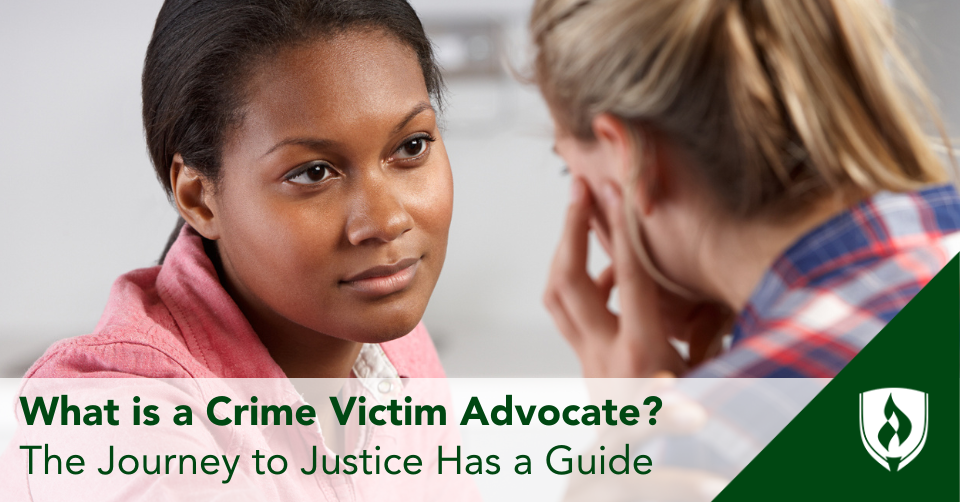What is a Crime Victim Advocate? The Journey to Justice Has a Guide
By Hope Rothenberg on 01/23/2024

The U.S. criminal justice system is far from perfect. That is one thing professionals in the field tend to agree on.
Court proceedings take months, if not years. Getting various courts and different systems to communicate effectively and work together can try the patience of a saint. In some cases it seems like the system moves way too slow, and in others, way too fast—and in both cases, our legal system still makes mistakes.
If you are interested in the criminal justice system, it’s likely that you care about justice. But whichever way a case goes, our justice process largely focuses on what to do with offenders, granting little guidance (if any) to crime victims and survivors.
You may find yourself asking…How can there be justice when the victims of a crime, the ones who have been wronged most, are left out?
This is where crime victim advocates come in.
What does a victim advocate do?
Victim advocates seek justice for crime victims and survivors—including victims’ family members and/or significant others. Advocates offer survivors emotional support and a sense of direction as they wind their way through the criminal justice process.
Some victim advocates also extend their services to crime witnesses struggling to cope with the resulting mental and emotional trauma.
Many victims have limited knowledge of their legal rights. They often don’t know what to expect from police or the district attorney’s office. Asking people to wade through each new process while also in shock, grief or trauma recovery is like asking a sinking ship to fly.
Victim advocates help demystify the criminal justice system by guiding victims through these processes.
Advocates may assist victims with developing safety plans to protect them against future potential threats and provide peace of mind. In addition, advocacy groups often equip victims with a wealth of resources—everything from access to support groups to referrals for legal services. Further resources may include:
- Crisis intervention
- Case planning
- Compensation and/or restitution application assistance
- General information about victims’ rights and the criminal justice process
- Court accompaniment
- Housing assistance
- Public assistance1
What are the goals of a victim advocate?
All victim advocates share the same goal: to show crime victims and survivors they’re never alone and assist them on the road to recovery.
Victim advocates guide people through situations most of us could never begin to imagine. They help survivors pursue justice and reclaim their strength. They work for victims—and with victims—to give them a voice.
And a reason for hope.
Where do victim advocates work?
Many victim service providers are nonprofit organizations. Local, county, and state governments may also have victim assistance programs.
At the federal level, the FBI runs its own victim services program. Additionally, the U.S. Department of Justice runs the Office for Victims of Crime ( OVC), which “is committed to enhancing the Nation’s capacity to assist crime victims and to providing leadership in changing attitudes, policies, and practices to promote justice and healing for all victims of crime.”2
The OVC works with each state to support victims in their time of need.
Do all victim advocates offer the same services?
Victim advocacy organizations each have a unique purpose and mission. Some may serve nationwide victims of all types of crime, like the National Center For Victims of Crime ( NCVC).
Others work with victims in specific cities or states. There are even advocacy groups with specialized services for victims of certain types of crimes. For instance, 1in6 is a nonprofit that provides a safe community, as well as group counseling, for men and boys who are victims of sexual assault.
How do you become a victim advocate?
Victim advocates work within the criminal justice system and many of them have backgrounds in criminal justice.
A good understanding of how the justice system in America works, legal procedure and crime allows victim advocates to educate and help their clients as much as possible. A Bachelor’s degree in Criminal Justice will offer courses in mental health and substance abuse, criminology and constitutional law to build a solid foundation.
The path to becoming a victim advocate can vary widely depending on which advocacy organizations you’d like to join. Typically, you do need a college degree. For this career, you should seek out employers you’d be most interested in working for and look into their specific requirements for victim advocates.
Could victim advocacy be your calling?
Would you describe yourself as a compassionate or empathetic person? When you see a tragedy in the news, does your heart go out to the surviving family members?
Is helping others important to you? Do you believe victims deserve support from their communities and peers?
If you’re nodding your head, there are people right now who need your helping hand.
Learn how you can help survivors and their families
Standing up for victims—whether in your own community or halfway across the country—takes tenacity, courage and knowledge of just what you’re up against. The more you understand about our criminal justice process, the better you’ll be able to advocate for, and support, survivors.
Pursuing your criminal justice degree could be a practical first step in your impending journey as a victim advocate. Learning about our system’s structure, flaws and how it all works could help you become a beacon of hope and change others’ lives for the better.
Check out Should I Be a Criminal Justice Major? Everything You Need to Know to Decide to see if these programs would be a good fit for you.
1Working Definition And Mission Statement [accessed December 2023] https://ovc.ojp.gov/sites/g/files/xyckuh226/files/model-standards/6/mission_statement.html
2About OVC [accessed December 2023] https://ovc.ojp.gov/about




